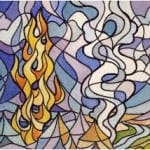The journey of the Jewish people has been long and arduous, but as the young people of Gush Katif used to sing, “an eternal people have no fear of the long voyage”. Yet even understanding this, we need at times to find the strength to walk the long trek. This is especially true as we begin to sense the excitement of arrival and can taste the sweet fulfilment of destiny. We are living in a time wherein many of the pieces of the prophetic puzzle are falling into place. The sense is that we are getting closer.
That simply makes tragic and painful events so much more tragic and painful. As “ the voice of the turtle dove has been heard in our land ” ( song of songs 2:12) we have also had to cope with the foolish and disastrous expulsion of the Jewish people from the thriving communities of Gush Katif. When we hear the footsteps of redemption we also need to make our ears attuned again, to the sounds of “anti-Jew” noises rising in all parts of the world. As we get closer we are suddenly engaged again in self-recrimination and angry discourse between segments of our people.
Where can we find the strength?
At the end of the book of Exodus we read about the feverish and inspired building of the Tabernacle. The presence of G-d would now travel with the people in the midst of their journey
” For the cloud of Hashem was upon the Mishkan by day, and there was fire within it at night, before the eyes of the entire house of Israel in all their journeys.(Exodus 40:38).
Yet Moshe who had supervised and the preparation and then had raised the tabernacle was suddenly blocked from entry .
” Moshe could not enter the Tent of Meeting because the cloud rested upon it and the glory of Hashem filled the Mishkan.” (Exodus 40:35).
What did Moshe do? He waited.
When the Israelites were on the edge of the Red Sea, the Egyptians were closing in from behind and the desert was closing in on the sides. They cried out to G-d. and Moshe then tells them the following;
“Don’t be afraid! Stand firm and see Hashem ‘s salvation that He will wreak for you today, for the way you have seen the Egyptians is [only] today, [but] you shall no longer continue to see them for eternity.(Exodus 14:13).
Yet in reality that salvation did not come immediately;
” Then the angel of G-d, who had been going in front of the Israelite camp, moved and went behind them, and the pillar of cloud moved away from in front of them and stood behind them. And he came between the camp of Egypt and the camp of Israel, and there were the cloud and the darkness, and it illuminated the night, and one did not draw near the other all night long.. And Moshe stretched out his hand over the sea, and Hashem led the sea with the strong east wind all night, and He made the sea into dry land and the waters split. ( ibid :19-21) .
What did the Israelites do “all night” ? They waited and prayed.
They waited and then they were redeemed.
Moshe waited and then he was “called”.
The book of Leviticus begins with the following words; “And He called ( Vayikra) to Moses, and the Lord spoke to him from the Tent of Meeting,”(Leviticus 1:1). Rashi points out that previously when G-d spoke to Moshe we see the use of the words of “And He spoke,( VaYidaber)” or “and He said(VaYomer) and also ” “and He commanded ( VaYitzav) ” . The use of Vayikra is instructive. It denotes a statement of affection .We see the same expression employed by the ministering angels when speaking to each other, as it says, “And one called ( Ve Karah) to the other and said, “Holy, holy, holy is Hashem Tzva-ot; the whole earth is full of His glory.”(Isaiah 6:3).
This lesson of “faithful patience” is one we need to learn as a people and as individuals , King David writes in psalms; “You have counted my wanderings; and placed my tears in Your flask. Is it not in Your accounting?(psalms 56:9).
What does it mean when the verse says ” You have placed my tears in Your flask”? The message is clear and dramatic. There is never a tear shed in vain or a prayer left unanswered. It is all about waiting for Hashem’s timing. It is all about the learning the art of faithful patience and waiting to be ” called”
LeRefuat Yehudit Bat Golda Yocheved

